×
The Standard e-Paper
Stay Informed, Even Offline

Eight years after promulgation of the Constitution, the controversial Gender Bill is still a mirage despite three attempts to have Parliament pass it.
First, former Justice and Legal Affairs committee chair Samuel Chepkonga’s proposal to have the gender principle implemented progressively elicited sharp reactions from the Bill’s proponents.